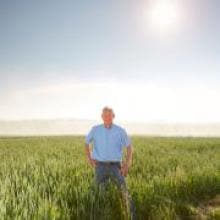Damianshof

Farming for the Next Generation
Farmer Bernd Olligs and his family live and work on the Damianshof farm. The Olligs family has been managing this farm for six generations. They cultivate sugar beet, potato, winter wheat, winter oilseed rape, and winter barley on around 115 hectares. The soil quality at the Rommerskirchen loess plain is exceptional and Olligs works on further improving the quality of the soil. The farm supports pollinators and biodiversity with the use of flowering strips, skylark plots, beetle banks, shrub gardens as well as nesting boxes for bees, owls and songbirds. With the Phytobac system, installed in 2012, they also contribute to local water protection. The farm has a high technical standard. An important next step in innovation is integrating digital technology to obtain a better picture of what is happening in his fields. Digitization gives real-time and field-specific decision-making support, from the selection of the correct variety and most exact dosage of crop protection products to the determination of the optimum time of application, and the early identification of plant stress factors. This results in greater sustainability, both ecologically and economically.
-
Farm name and location: Damianshof – Rommerskirchen, Germany.
-
History: Bernd Olligs. Founded in 1845, Damianshof has been farmed by six generations of the same family.
-
Farm Size: 115 hectares.
-
Primary crops: Winter wheat, sugar beet, potatoes, winter barley, oilseed rape.
-
Notable partnerships: FlächenAgentur Rheinland GmbH, Stiftung Rheinische Kulturlandschaft, OICOS Konzepte GmbH.

The Power of Microorganisms
During the cleaning of the field sprayers, crop protection residues can become a problem. To ensure that these residues do not enter the water system, Bernd Olligs uses an innovative biological system called Phytobac®. Installed on Damianshof back in 2012, it reliably removes any residues of crop protection products and protects the local water source. How does the solution work? From a watertight concrete platform, where the sprayer is filled and cleaned, the wastewater is channeled and collected in buffer tanks and then flows to a watertight basin that is filled with a substrate mix of soil and straw. The cleaning water can drip onto this mix, which is the heart of the system. The microbes living in the mix biologically break down any residues found in the water.
Contact us
We're happy to connect with you! Contact Florian Jenner with any questions or inquiries.





















